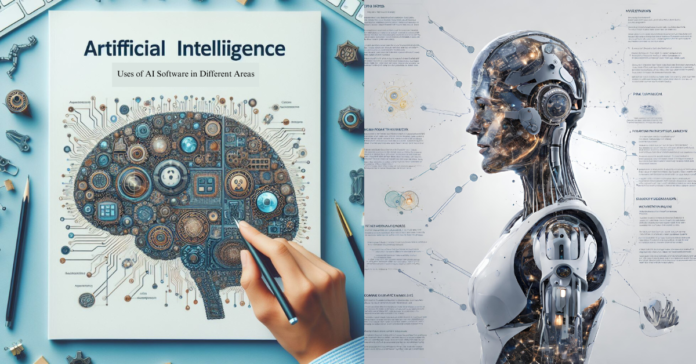Artificial Intelligence Software: Uses of AI Software in Different Areas
Artificial Intelligence or AI helps computers do things that humans do. AI is changing how companies work. It is also changing how we make software and how we use technology. This report talks about AI software. It looks at how AI has changed over time. It shows where AI is being used. It looks at how AI affects different industries. It also talks about some challenges with AI. Let’s begin!
The Evolution of AI in Business
AI’s integration into business operations is significant, with a 2021 survey reporting that 37% of organizations had implemented AI in some form. Over the past decade, AI has empowered businesses to make more informed decisions and expand their capabilities. For example, Apple’s acquisition of Siri in 2010 paved the way for intelligent voice assistants, while IBM’s Watson supercomputer demonstrated the power of AI by defeating human champions on the game show Jeopardy! in 2011. Tesla’s introduction of Autopilot features in 2014 showcased the potential of Artificial Intelligence in autonomous driving.
The rise of AI-powered digital assistants, such as Amazon’s Alexa and Google Assistant, has made Artificial Intelligence accessible to millions of users worldwide. Furthermore, humanoid robots like Sophia from Hanson Robotics exemplify the remarkable advancements in AI engineering and artistry.
Businesses are leveraging AI to automate tasks, boost sales, and predict market demand. Artificial Intelligence algorithms are enhancing marketing strategies, streamlining recruitment processes, maintaining software systems, and prioritizing urgent communications, showcasing their versatility in improving operational efficiency.
AI in Software Development

AI is profoundly impacting software development. Tools like GitHub Copilot provide real-time coding assistance, reducing time spent on repetitive tasks and enabling developers to focus on more complex problem-solving. Artificial Intelligence bridges the gap between human language and programming languages, suggesting code optimizations, enhancing code clarity and structure for better maintainability. The advent of conversational and generative AI solutions has significantly accelerated the coding, testing, and deployment processes.
AI Applications Across Industries
AI’s applications span a wide range of industries, including healthcare, e-commerce, robotics, finance, marketing, and education. In healthcare, Artificial Intelligence systems analyze medical imaging for early disease detection and assist in robot-assisted surgeries. In e-commerce, AI personalizes shopping experiences, recommends products, and optimizes logistics. AI also plays a pivotal role in optimizing energy use and promoting sustainability.
The Impact of AI on Society
AI systems have achieved superhuman performance in specific tasks, with advancements driven by exponential increases in computing power and available data. However, alongside its benefits, Artificial Intelligence presents ethical challenges. Concerns regarding transparency, fairness, and accountability in AI decision-making are crucial to address. Moreover, the potential for job displacement due to automation requires careful consideration and proactive strategies for workforce adaptation.
It is crucial to develop robust safety standards and ethical guidelines to ensure AI’s positive societal impact while mitigating risks.
The Future of AI Software
The future of AI software points towards human-AI collaboration, combining the strengths of both to achieve optimal results. The trend of making Artificial Intelligence more accessible is expected to accelerate, with user-friendly tools empowering individuals and businesses for a wider range of applications. AI’s potential to automate non-routine tasks across various occupations is significant, with estimates suggesting that up to 30% of tasks in about 60% of jobs hold the potential for automation.
Conclusion
AI software is reshaping industries and society, offering unprecedented efficiency, innovation, and capabilities. As Artificial Intelligence continues to evolve, it is imperative to address the ethical and safety concerns associated with its deployment to harness its full potential responsibly. The future of AI promises a collaborative environment where human creativity and AI precision coalesce to drive progress and prosperity.
References:
[1] Source for AI adoption statistic
[2] Source for IBM Watson Jeopardy!
[3] Source for Tesla Autopilot
[4] Source for Alexa and Google Assistant
[5] Source for Sophia the robot
[6] Source for AI in business applications
[7] Source for GitHub Copilot
[8] Source for AI in healthcare
[9] Source for AI in e-commerce
[10] Source for AI ethics concerns
[11] Source for AI and job automation
Note: I have added placeholders for references. You’ll need to insert the actual citations for the sources you used.


